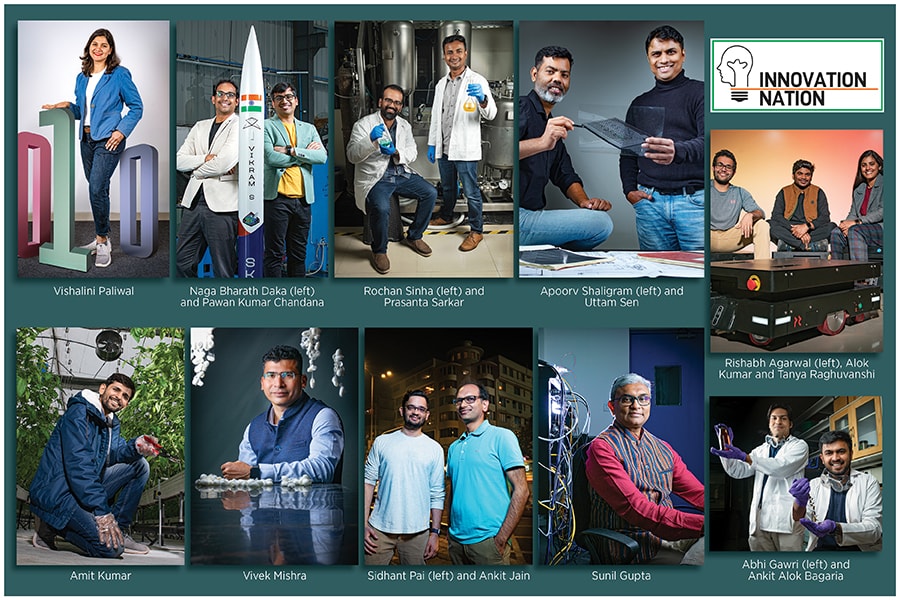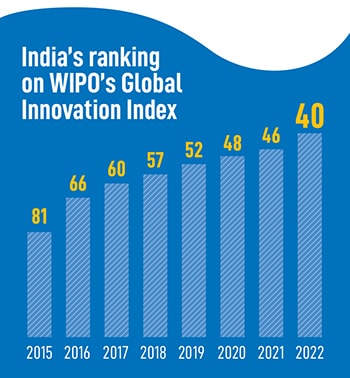Step into the future: A taste of the innovations brewing in India
India has emerged as a genuine global hub of startups-led Innovation



Innovation for the sake of it could probably be an interesting intellectual exercise, but it’s really when innovation meets strong market demand that the magic happens. Sometimes, the impact can be spectacular, at a billion-people scale, like India’s Unified Payments Interface (UPI).
From a headlines perspective, over the last several years, the government’s efforts have indeed raised the profile of technology-led startups—as a proxy for innovation—in the country. A Union minister pointed out last September that India’s rank on the global innovation index, compiled every year by the World Intellectual Property Organization (WIPO), a United Nations agency, has jumped 41 places from 81 to 40 between 2015 and 2022.
India is today, genuinely a global startup hub and destination for tens of billions of dollars of venture money.
Finance Minister Nirmala Sitharaman’s latest Budget proposals were seen as ensuring the continued support of innovation in the country. Her latest proposals include setting up three centres of excellence for artificial intelligence, 100 labs in engineering colleges around the country to work on 5G wireless and an accelerator fund dedicated to supporting agritech entrepreneurs in rural India.
Without taking away from these achievements, much more needs to be done, agree young entrepreneurs as well as seasoned technologists, founders who have persevered for decades, and finance and policy experts.
When asked in an interview recently to pick one thing she would change to improve the Indian startup ecosystem, “Ease of doing business," quipped Anjali Bansal, an accomplished venture capital (VC) investor. Bansal, founding partner at Avaana Capital, is among those leading the Indian VC ecosystem’s investments into climate tech in the country.
She was speaking on a podcast, The VCpreneur. Her interview was published on January 22.
Bansal has previously built and led the Indian operations of multinational firms, and currently sits on a committee that’s directing the implementation of ONDC, or open network for digital commerce that many hope will do for ecommerce in the country, what UPI has done for payments.
Suresh Sambandam, founder and CEO of Kissflow, a provider of cloud software for workflow management and no-code business applications, is more direct: “In India, the biggest challenge is the government."
The government isn’t doing enough to eliminate arduous paperwork that startups need to file, he says. Further, rules related to intellectual property, employee stock options or restricted stock units and various taxes all add up to make compliance and “a total mess", he says.
“For a company I was mentoring, I got $200,000 investment from an investor in the US, and the banks took so much time for the KYC that the startup was upon the deadline by which it was expected to return the money," Sambandam says.
 “We somehow scrambled through, and such issues are really hurting" startups, he says.
“We somehow scrambled through, and such issues are really hurting" startups, he says.
In the software world, the IT services industry has spent decades acquiring deep domain knowledge, building business software in every important industry, Sambandam points out. Therefore, India is now a destination for building software teams for both our own startups as well as a rapidly growing number of foreign companies.
And today, after Covid, one can set up these teams anywhere, he says, even in the smaller towns.
The government needs to sharpen its focus on eliminating regulatory obstacles and take bolder bets, India’s entrepreneurs say. The Budget announcements were great, but the devil is in the details, as they say. Consider what Ankit Alok Bagaria says, at Loopworm, a young insect biotech venture in Bengaluru.
In the past, most of the time the budgetary money allocated has gone into various subsidies or loans. While loans and subsidies are important for agri-stakeholders, the grant money to scale up innovative ideas to proof-of-concept, to pilots to commercialisation is minimal, Bagaria says.
The Indian biotechnology space also faces a similar dilemma, he says. In the previous year’s Budget, a significantly large part of the allocated amount that went to the Department of Biotechnology was spent on autonomous bodies and institutes focusing on biotech research. However, support for commercialisation to startups and corporates remained limited, he says.
Bagaria was hoping that the latest Budget would offer scale-up money as well, “independent of whether or not any startup has availed a smaller grant previously".
“If the startup is ready, they should be helped with the money to scale up," he says. It’s not clear yet if the latest Budget had any such allocations. Sitharaman also didn’t immediately specify where the money would come for the accelerator fund, for example, and how much.
Another area in which change is still nascent is translating scientific research into commercial businesses that can solve large nation-scale problems.
“There is a lot of good scientific research that isn’t being converted to businesses, because a lot of collaborations happen only on paper between academia and industry," says Vivek Mishra, co-founder and CEO of Fibroheal, a venture in Bengaluru that is developing silk-protein-based wound-care products.
“Apart from that, many times, products are built but not based on market needs," he says. In India, unlike in Silicon Valley (and Stanford), for example, academic researchers are still wary of going beyond their research and publishing papers and so on, he says.
Even in cases where a researcher has patents for something innovative, only a handful of researchers have ventured into building startups based on their science know-how, he points out.
In the articles that follow, we profile 10 early-stage startups that are braving India’s tough environment and attempting to bring genuine innovations to the market.
First Published: Feb 14, 2023, 12:36
Subscribe Now